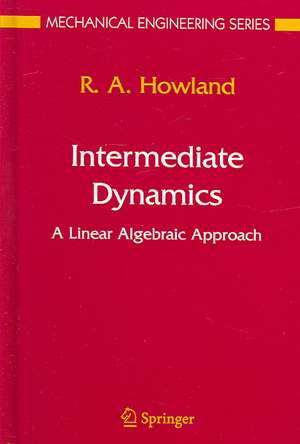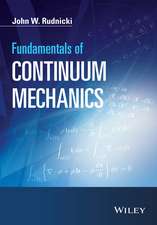Intermediate Dynamics: A Linear Algebraic Approach: Mechanical Engineering Series
Autor R.A. Howlanden Limba Engleză Hardback – 16 sep 2005
Features include:
- A general, uniform approach applicable to "machines" as well as single rigid bodies
- Complete proofs of all mathematical material. Similarly, there are over 100 detailed examples giving not only the results, but all intermediate calculations
- An emphasis on integrals of the motion in the Newtonian dynamics
- Development of the Analytical Mechanics based on Virtual Work rather than Variational Calculus, both making the presentation more economical conceptually, and the resulting principles able to treat both conservative and non-conservative systems.
| Toate formatele și edițiile | Preț | Express |
|---|---|---|
| Paperback (1) | 403.53 lei 6-8 săpt. | |
| Springer Us – 11 feb 2011 | 403.53 lei 6-8 săpt. | |
| Hardback (1) | 408.92 lei 6-8 săpt. | |
| Springer Us – 16 sep 2005 | 408.92 lei 6-8 săpt. |
Din seria Mechanical Engineering Series
-
 Preț: 391.84 lei
Preț: 391.84 lei - 18%
 Preț: 1110.72 lei
Preț: 1110.72 lei - 15%
 Preț: 593.73 lei
Preț: 593.73 lei - 18%
 Preț: 944.99 lei
Preț: 944.99 lei - 15%
 Preț: 653.14 lei
Preț: 653.14 lei - 17%
 Preț: 363.12 lei
Preț: 363.12 lei - 18%
 Preț: 1239.05 lei
Preț: 1239.05 lei - 15%
 Preț: 640.06 lei
Preț: 640.06 lei - 18%
 Preț: 1129.65 lei
Preț: 1129.65 lei - 15%
 Preț: 522.24 lei
Preț: 522.24 lei - 15%
 Preț: 654.77 lei
Preț: 654.77 lei - 15%
 Preț: 643.34 lei
Preț: 643.34 lei - 15%
 Preț: 611.40 lei
Preț: 611.40 lei - 18%
 Preț: 765.96 lei
Preț: 765.96 lei - 20%
 Preț: 631.70 lei
Preț: 631.70 lei - 18%
 Preț: 1009.22 lei
Preț: 1009.22 lei -
 Preț: 418.34 lei
Preț: 418.34 lei - 15%
 Preț: 640.71 lei
Preț: 640.71 lei -
 Preț: 403.53 lei
Preț: 403.53 lei - 18%
 Preț: 813.97 lei
Preț: 813.97 lei - 18%
 Preț: 1386.48 lei
Preț: 1386.48 lei - 18%
 Preț: 951.47 lei
Preț: 951.47 lei - 18%
 Preț: 833.09 lei
Preț: 833.09 lei - 18%
 Preț: 936.60 lei
Preț: 936.60 lei - 15%
 Preț: 644.49 lei
Preț: 644.49 lei - 18%
 Preț: 941.05 lei
Preț: 941.05 lei - 18%
 Preț: 1386.17 lei
Preț: 1386.17 lei -
 Preț: 399.67 lei
Preț: 399.67 lei - 18%
 Preț: 1389.44 lei
Preț: 1389.44 lei - 18%
 Preț: 790.46 lei
Preț: 790.46 lei - 18%
 Preț: 1388.22 lei
Preț: 1388.22 lei - 18%
 Preț: 1024.53 lei
Preț: 1024.53 lei - 15%
 Preț: 590.16 lei
Preț: 590.16 lei - 18%
 Preț: 1234.00 lei
Preț: 1234.00 lei - 18%
 Preț: 1386.62 lei
Preț: 1386.62 lei - 15%
 Preț: 543.85 lei
Preț: 543.85 lei -
 Preț: 391.61 lei
Preț: 391.61 lei - 18%
 Preț: 944.19 lei
Preț: 944.19 lei - 18%
 Preț: 736.16 lei
Preț: 736.16 lei - 18%
 Preț: 943.88 lei
Preț: 943.88 lei - 15%
 Preț: 693.21 lei
Preț: 693.21 lei - 18%
 Preț: 781.77 lei
Preț: 781.77 lei - 15%
 Preț: 639.08 lei
Preț: 639.08 lei - 23%
 Preț: 737.28 lei
Preț: 737.28 lei - 15%
 Preț: 641.53 lei
Preț: 641.53 lei -
 Preț: 401.42 lei
Preț: 401.42 lei
Preț: 408.92 lei
Nou
Puncte Express: 613
Preț estimativ în valută:
78.25€ • 81.86$ • 65.00£
78.25€ • 81.86$ • 65.00£
Carte tipărită la comandă
Livrare economică 02-16 aprilie
Preluare comenzi: 021 569.72.76
Specificații
ISBN-13: 9780387280592
ISBN-10: 0387280596
Pagini: 542
Ilustrații: XX, 542 p.
Dimensiuni: 155 x 235 x 29 mm
Greutate: 0.91 kg
Ediția:2006
Editura: Springer Us
Colecția Springer
Seria Mechanical Engineering Series
Locul publicării:New York, NY, United States
ISBN-10: 0387280596
Pagini: 542
Ilustrații: XX, 542 p.
Dimensiuni: 155 x 235 x 29 mm
Greutate: 0.91 kg
Ediția:2006
Editura: Springer Us
Colecția Springer
Seria Mechanical Engineering Series
Locul publicării:New York, NY, United States
Public țintă
GraduateCuprins
Linear Algebra.- Prologue.- Vector Spaces.- Linear Transformations on Vector Spaces.- Special Case—Square Matrices.- Epilogue.- 3-D Rigid Body Dynamics.- Prologue.- Kinematics.- Kinetics.- Epilogue.- Analytical Dynamics.- Prologue.- Analytical Dynamics: Perspective.- Lagrangian Dynamics: Kinematics.- Lagrangian Dynamics: Kinetics.- Integrals of Motion.- Hamiltonian Dynamics.- Epilogue.
Recenzii
From the reviews:
"Howland ( Univ. Of Notre Dame) has prepared a mathematical treatment of mechanics/dynamics in three dimensions with an emphasis on linear-algebraic details. The book is well written, showing a real appreciation for the underlying mathematics. ... Summing Up: Recommended. Upper-division undergraduates through professionals." (J. D. Fehribach, Choice, Vol. 43 (10), June, 2006)
"Howland ( Univ. Of Notre Dame) has prepared a mathematical treatment of mechanics/dynamics in three dimensions with an emphasis on linear-algebraic details. The book is well written, showing a real appreciation for the underlying mathematics. ... Summing Up: Recommended. Upper-division undergraduates through professionals." (J. D. Fehribach, Choice, Vol. 43 (10), June, 2006)
Textul de pe ultima copertă
As the name implies, Intermediate Dynamics: A Linear Algebraic Approach views "intermediate dynamics"--Newtonian 3-D rigid body dynamics and analytical mechanics--from the perspective of the mathematical field. This is particularly useful in the former: the inertia matrix can be determined through simple translation (via the Parallel Axis Theorem) and rotation of axes using rotation matrices. The inertia matrix can then be determined for simple bodies from tabulated moments of inertia in the principal axes; even for bodies whose moments of inertia can be found only numerically, this procedure allows the inertia tensor to be expressed in arbitrary axes--something particularly important in the analysis of machines, where different bodies' principal axes are virtually never parallel. To understand these principal axes (in which the real, symmetric inertia tensor assumes a diagonalized "normal form"), virtually all of Linear Algebra comes into play. Thus the mathematical field is first reviewed in a rigorous, but easy-to-visualize manner. 3-D rigid body dynamics then become a mere application of the mathematics. Finally analytical mechanics--both Lagrangian and Hamiltonian formulations--is developed, where linear algebra becomes central in linear independence of the coordinate differentials, as well as in determination of the conjugate momenta.
Features include:
o A general, uniform approach applicable to "machines" as well as single rigid bodies.
o Complete proofs of all mathematical material. Similarly, there are over 100 detailed examples giving not only the results, but all intermediate calculations.
o An emphasis on integrals of the motion in the Newtonian dynamics.
o Development of the Analytical Mechanics based on Virtual Work rather than Variational Calculus, both making the presentation more economical conceptually, and the resulting principles able to treat both conservative and non-conservative systems.
Features include:
o A general, uniform approach applicable to "machines" as well as single rigid bodies.
o Complete proofs of all mathematical material. Similarly, there are over 100 detailed examples giving not only the results, but all intermediate calculations.
o An emphasis on integrals of the motion in the Newtonian dynamics.
o Development of the Analytical Mechanics based on Virtual Work rather than Variational Calculus, both making the presentation more economical conceptually, and the resulting principles able to treat both conservative and non-conservative systems.
Caracteristici
Complete, rigorous review of Linear Algebra, from Vector Spaces to Normal Forms Emphasis on more classical Newtonian treatment (favored by Engineers) of rigid bodies, and more modern in greater reliance on Linear Algebra to get inertia matrix and deal with machines Develops Analytical Dynamics to allow the introduction of friction Includes supplementary material: sn.pub/extras








